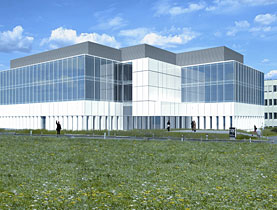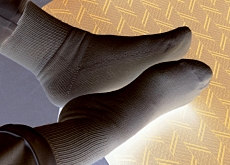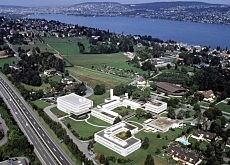Zurich secures $90 million nanotech laboratory

The Federal Institute of Technology in Zurich will join forces with computer giant IBM to build a state-of-the-art nanotechnology research laboratory near to the city.
The pioneering deal will enhance Zurich’s status as one of the world’s leading centres in the cutting-edge science and allows for further collaborations with companies and institutions.
The $90 million (SFr93.5 million) research facility will be built in Rüschlikon, along Lake Zurich, by the spring of 2011. It will house 900 square metres of “cleanroom” space – laboratories insulated against vibrations, electromagnetic fields and temperature fluctuations.
IBM will pay around $60 million to construct the building and rent out space to the institute. Both partners will share the $30 million cost of fitting out the lab with specialist equipment.
This funding arrangement allows the institute, which is not permitted to take out large loans, to participate in such a large-scale project.
Once built, the lab will have separate areas for IBM and institute projects and a shared space for collaborative research. A breakthrough agreement on intellectual property rights will allow both parties to freely use the fruits of collaborative research for their own ends.
“We should have got together decades ago, but this is an ideal opportunity for both IBM and the institute to build upon this win-win proposition based upon the common science we want to pursue,” institute vice-president of research, Peter Chen, told swissinfo.
“We want to bring together scientists from both organisations to generate new projects that neither of us would have done alone. We also want to open the way to the commercialisation of these projects which has been identified as a weak point of the institute.”
Best researchers
IBM’s director of research, John Kelly, believes the public-private partnership is vital to the commercial advancement of nanotechnology.
“Together, we can tackle tougher issues than we could as individual researchers and the breakthroughs will be bigger. Collaborations will be what distinguishes winners and losers in this field in the 21st century,” he said.
“We chose [the Federal Institute of Technology] as partners because we believe that the best and brightest nanotechnology researchers exist here. This investment will push Switzerland near to the top of nanotechnology globally.”
Nanotechnology involves the manipulation of atoms and molecules, at dimensions of roughly one millionth of a millimetre. Products are increasingly playing a part in many fields, from computer chips to medicine, energy, fabrics, lubricants, the food industry and engineering.
The range of applications is increasing at such a pace that two other purpose-built cleanrooms at the institute are already at full capacity, years before it was anticipated that more space would be needed.
The institute has a micro- and nanosciences department with 43 research groups currently working on some 400 projects. It already plans to collaborate with the Swiss Federal Laboratory for Materials Testing and Research at the new research facility and is looking for other partners.
swissinfo, Matthew Allen in Zurich
A nanometre is one millionth of a millimetre.
Nanoscience and nanotechnology encompass a range of techniques rather than a single discipline and stretch across the scientific spectrum, touching on medicine, physics, engineering and chemistry.
The size and scale of the nanotechnology industry is unclear in Switzerland. One reason is that there is no international standard definition of the science, making it hard to determine whether companies use nanotechnology or not.
A 2004 report by the Royal Society in Britain estimated research and development on nanotechnology to be worth some SFr1.57 billion ($1.5 billion) a year in Europe.
This compares with $800 million in Japan in 2003, $3.7 billion for a US project lasting from 2005 to 2008 (excluding defence expenditure) and a pledge from the British government to spend $78.5 million a year on nanotechnology between 2003 and 2009.

In compliance with the JTI standards
More: SWI swissinfo.ch certified by the Journalism Trust Initiative












You can find an overview of ongoing debates with our journalists here . Please join us!
If you want to start a conversation about a topic raised in this article or want to report factual errors, email us at english@swissinfo.ch.